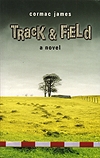TRACK & FIELD
 The disingenuously titled Track & Field is
his first published novel and while his stories roll on the modernist
project with great energy, this work takes us back to the heyday of
modernism's birth, but in the country Joyce chose to flee--Ireland. The
Irish Civil War is in its sixth month, the British have pulled back to
the northern six counties, and the south is in the hands of conflicting
factions--those who want to seize the whole of Ireland for the
Republic, and those who accept the Treaty division. It's the aftermath
of a moment which has since become part of the Irish national myth, and
perhaps in opposition to this myth, Cormac James has evoked one of his
own: a Book of the Dead in which three brothers carry the late fourth
from Dublin to their homeland. The corpse crosses night country, but
must pass barriers and gatekeepers, his brothers rising to each
challenge with wit and cunning. Yet James' writing is scrupulously
realistic, narrated with a shellshocked, at times affectless, tone
which lets simple acts echo with meaning, as at the point when the
brothers attempt to slide the coffin from a room upstairs to the
groundfloor:
The disingenuously titled Track & Field is
his first published novel and while his stories roll on the modernist
project with great energy, this work takes us back to the heyday of
modernism's birth, but in the country Joyce chose to flee--Ireland. The
Irish Civil War is in its sixth month, the British have pulled back to
the northern six counties, and the south is in the hands of conflicting
factions--those who want to seize the whole of Ireland for the
Republic, and those who accept the Treaty division. It's the aftermath
of a moment which has since become part of the Irish national myth, and
perhaps in opposition to this myth, Cormac James has evoked one of his
own: a Book of the Dead in which three brothers carry the late fourth
from Dublin to their homeland. The corpse crosses night country, but
must pass barriers and gatekeepers, his brothers rising to each
challenge with wit and cunning. Yet James' writing is scrupulously
realistic, narrated with a shellshocked, at times affectless, tone
which lets simple acts echo with meaning, as at the point when the
brothers attempt to slide the coffin from a room upstairs to the
groundfloor:
-
"There were lines and arcs tracked wherever on the wood we'd had to
shove and turn and swivel it. The weight of it was unbelievable. She
had already cleared out all of his things and once the books were gone
the only trace of him would be these lines and arcs on the wood where
we'd had to slide and swivel it and those would be worn away again in a
month. We couldn't believe the weight of it."
Track & Field inhabits a masculine world--one of fistfights, reticence, and pissing out of doors--in a state beyond control. Women remain small presences, providing tea and a subject for gossip, almost outside the bounds of the brothers' ken. The ruptures in the novel are scarcely those between English and Irish, but those between city and country man, between the sexes, between brothers. It is by no means a narrow book, and though still only available from Ireland and the UK, this fine novel deserves a readership far beyond its native shores.



